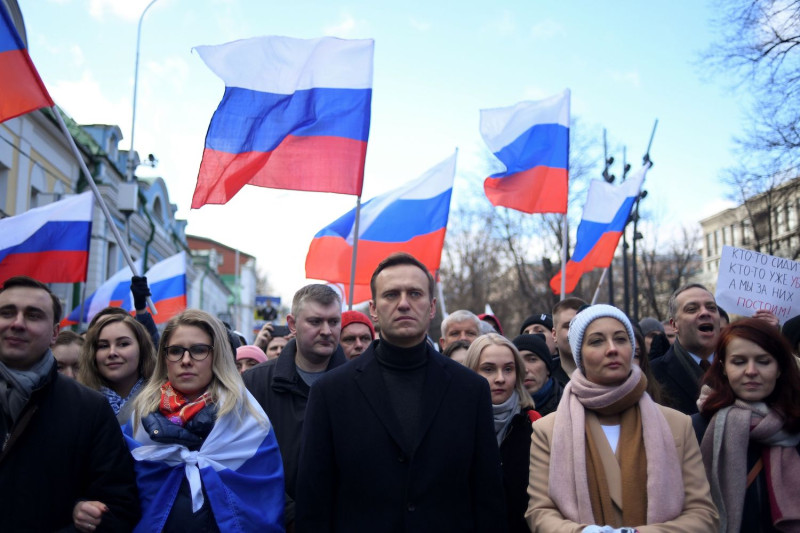Protests have erupted in Russia over the last few days, with many attendees expressing support for political activist Alexei Navalny.
The demonstrations have at times grown tense. Protests have been effectively banned since the outbreak of the coronavirus due to the potential effect they have on its spread. Russia has one of the worst COVID death tolls globally, with almost 70,000 people reported to have lost their life to the virus.
Navalny made international headlines in August 2020 when he suddenly fell ill on an airplane. Western governments were quick to accuse the Russian government of an attempted assassination. Germany, where Navalny was treated, said that the Soviet-era nerve agent novichok was the cause of his stroke with death. The Russian government have consistently denied these claims and says it has not seen evidence of the medical conclusions.
With most people accurately predicting how easily Navalny could be turned into a martyr figure for Russia’s opposition, some questioned why Moscow would attempt an assassination. The fact that he is barred from public office, for previously being convicted of embezzlement, adds further weight to the argument that the Russian government carrying out such an attack on Navalny would be more of a threat to their power than leaving him be.
The government’s brash arrest upon Navalny’s return to Russia and the inevtable public outcry this sparked indicates that Moscow may either be happy or incompetent enough to polish the image of him as a freedom fighter
Navalny’s popularity is undeniable. His YouTube channel has 3.5 million followers and the most recent upload has reached almost 100 million views in a fortnight. Protestors have gathered in their thousands in eighteen cities across the country to express their anger at his arrest.
Authorities have said he’s been apprehended for violation of parole.
Yet, Navalny is not the ‘saviour fighting for democracy’ that the Western media has portrayed him as. He has consistently proven himself to be an ultranationalist and has mixed with far-right figures from across Russia.
He was kicked out of the liberal Yabloko party in 2007 and is not remembered fondly. Former colleague and philologist Engelina Tereyeva accused him of regularly using racial slurs, basing his relationships with people on their ethnicity and warned that he is “the most dangerous man in Russia”. He’s denied these claims.
He’s publicly advocated for the deportation of illegal immigrants and the introduction of a visa scheme for Central Asian countries. He’s called for all Georgians to be expelled from Russia and was a loud supporter of the Russo-Georgian war in 2008.
Navalny previously endorsed Stop feeding the Caucasus. At one of the groups rallies he made unsubstantiated claims of girls “being wrapped up in a burqa and having 25 children” in the Muslim-majority Republic.
Perhaps most damningly, Navalny has shown support for the annual Russian March and its extremist attendee groups that regularly flaunt ultranationalist and racist views.
Russia’s government has tried to ideologically attack Navalny on two fronts, the extremist elements of his activism and his supposed foreign backing.
Whilst the first point is clear, the second is more convoluted. Indeed, Navalny was given a fellowship by America’s Yale University and was given a grant to complete a leadership course at the campus. The Kremlin has consistently attempted to draw attention to this and question why this backing exists.
They were also quick to call out the US embassy for its behaviour in relation to the protests. Among hypocritical calls for leniency were thinly veiled instructions for those who wished to attend protests with one tweet supposedly warning US citizens that protestors would gather in Moscow centre and then “march towards the Kremlin.”
The Russian government attempt to make the protests and Navalny’s influence appear as a pure result of foreign interference are not dispersing the crowds though. Russia’s communist youth league said the authorities were fanning the flames with “Their unconvincing attempts to justify themselves and blame everything on the intrigues of Western special forces”.
The current figurehead of Russia’s opposition doesn’t offer the peoples of Russia much in terms of progress. As the Kremlin bungles its response to this extremist though, it gives motivation for rightfully disgruntled Russians to march on the streets, holding diverse desires that often contradict Navalny’s. Currently Moscow is struggling to keep its people happy whilst clumsily giving a platform to an extremist who has little more to offer Russians than ultra-nationalism.
Mali Kakembo, is a member of the YCL’s Wales branch



